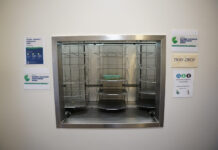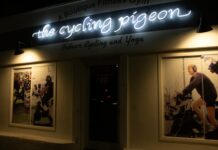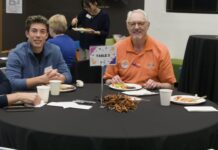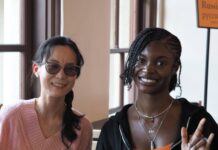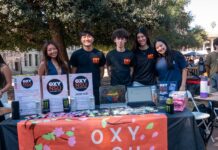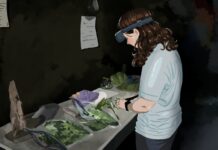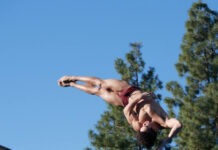Blue eyes
Pounding, rushing
Camera lights and smiles, flashing
Dusky blue, like the fading, setting sky
Could you take a photo for me please?
Group photos, and then
Individual modeling
A cane’s tip, reaching for the next step of stone
Catch the river, and the sunset
And maybe the boats
But don’t make me look fat
A hand, feebly reaching
It’s for my profile, you know
…
Racing, crushing
It’s stretched out to me, palm up, now
Up and down the stairs, running
Pointing out souvenirs, just doing some shopping
Time has stopped
It’s only three euros—ten, or nothing
Shout French, English, Spanish
All at once, clamor and shouting
At least, for me, it has
…
It was but a second, and he’s already moved on
That fragile hand, reaching
As others pass without a glance or stop
His lips are moving, but are soundless to the world
More like a prayer, than a pleading
Gentle, but resigned, like—or because—he knows
That to everyone, he’s mute
Because it’s what they chose
Step after step
Those thin, wizened feet make
Twisted ankles, and wispy white hair
Tremble with each one he takes
But patiently so, up those steps he goes
Bent over double, oh unjust burden of the world
Whispering prayers for them—for us—to see
Those blind, deaf, and lame people
More crippled and sorrowed than he
–”The Beggar At Rialto Bridge” by Eileen Lee
This weekend, Occidental’s InterVarsity Christian Fellowship had its annual fall conference retreat on Catalina Island, with multiple other InterVarsity groups ranging from the Claremont Colleges to Redlands. And while a lot of it was wonderful food, idyllic island life and fun and games, there was a lot of unearthing and digging up of the deep things as well. That meant a lot of discomfort, transparency and vulnerability.
I’ve realized at Occidental (and probably other campuses, too) that when you ask someone, “How are you doing?” and they say, “Tired,” it usually means a lot more than a physical state. This weekend was a time for getting terribly (and sometimes, terrifyingly) honest about what “tired” meant for each and every person. And regardless of what kind of opinion an individual has toward Christianity, it’s very clear that Occidental’s Christians are very human as well, as much as anyone else on the Occidental campus.
Deep things we dug out included feelings of inadequacy in Occidental’s academically competitive environment, low self-confidence and doubt, struggles with depression and suicidal thoughts and loneliness even while being surrounded by friends. Many of us were overwhelmed by school, relationships and all the inner voices of confusion and discouragement that just won’t shut up.
In hours of listening before speaking and sharing without sugarcoating, walls of reputation and personal pride were all set down. It is a difficult thing to do, to lay down all pretense and come unvarnished and un-airbrushed for all to see. And it is equally difficult to hear people you are close with admit struggles that they have carried for so long, without you even knowing. The depth of our human brokenness comes seeping out with no hindrance, no hiding and no pretending. The question, then, is to what end?
Since I’ve started writing this blog, I’ve been pretty harsh on the Christian Church for what we’ve failed to do. But on the flip side of that, I also want to emphasize what the Christian Church was originally called to do. And one of those things is to go to those uncomfortable places and uncover those wounds for the sake of seeing a community healed and reconciled.
The Bible says that when one person, or one part of the Body of Christ, suffers, the whole community or body suffers together. Period. On the other hand, when a part of the Body is uplifted and healed, the whole Body is uplifted and healed.
“But God has so composed the body … that there may be no division in the body, but that the members may have the same care for one another. If one member suffers, all suffer together; if one member is honored, all rejoice together.” (1 Corinthians 12:24-26 ESV)
As the Christian Church believes the ultimate end of the death and resurrection of Jesus Christ was to reconcile humans with God, we also strive to do as He did—to reconcile with one another, human to human, soul to soul. As Christ gave up his life for a greater cause, so we lay down our personal reputations and perfectly-crafted images so that we might demonstrate justice toward one another by being transparent. Instead of shying away from the full realization of our own brokenness, we instead give up our personal comfort, sanity and the fear of pain in order to support each other in our individual battles. I believe this is, on a small scale, justice—reflecting Christ by doing what He first did for us.
I included the previous spoken word, “The Beggar at Rialto Bridge,” which I wrote while in Italy two years ago, because this weekend made me realize that the cost of Instagram-filtered facades, pretty pictures and statuses is too high. The Christian Church does no justice within itself by holding onto them. And neither do we as humans do justice to each other, inside or outside of the Church, by keeping those prettily decorated walls up. It is not justice to say to ourselves and to each other that things are okay when they are not—to say ‘peace, peace’ when there is no peace.
The humans comprising the Christian Church are just human, though acting humanely is something we don’t have the best track record of doing. It’s something we haven’t done enough for many people—including many students and staff here on campus—who have been burned by a Church too scared or too proud to admit its own human brokenness. But I hope it’s something that can be changed in time, starting here with intentional listening and intentional sharing with intentional transparency.
I pray and hope that a culture of vulnerability makes its place here at Occidental, a culture that—despite the initial discomfort—will create justice for the individual, and therefore the community as a whole. This is done by deeming each others’ well-being of greater cause than our own personal comfort or ease. This is accomplished by no longer condemning, but rather carrying each others’ humanity until the end, for as long as it takes. So I pray and hope that Occidental’s InterVarsity Fellowship learns to not only do justice to itself by supporting and carrying each other as a group, but to do justice outwardly by opening and giving space to others on campus to be open in their humanity and brokenness, without fear of rejection or humiliation.
![]()




